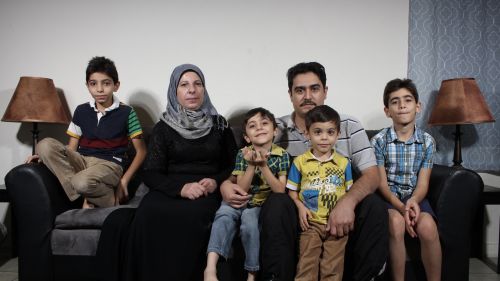Chicago: Embracing Refugees for the Good of All

Suzanne Akhras Sahloul discusses the positive impact of refugees and immigrants on communities in Chicago.
When Ahmad, Hannah, and their four children resettled in Chicago from Syria in late summer 2016, they were overwhelmed with the thought of starting over in a strange city—they had no friends, had no jobs, spoke no English. When I visited them at their apartment, I learned that Ahmad was in a wheelchair due to having contracted polio as a child. He was from the city of Homs, the city I was born in, where he worked as a tailor before the crisis hit in 2011, and before his family fled to Jordan. "What kind of opportunities do I have as someone who is in a wheelchair, a person with a disability?" he asked me.
This family is just one of many that fled Syria in what became the worst humanitarian crisis of our lifetime. Indeed, more than six million refugees live outside of Syria, and another roughly six million people are internally displaced in the country. And the refugee crisis is a global one. In mid-2020, more than 80 million people around the globe were displaced by war and oppression.
There is an urgent need to welcome and integrate refugees and immigrants into our communities—not just for these individuals but for the good of our cities and ourselves.
The contributions of immigrants and refugees
While some may fear their foreignness or presume they don’t contribute equally, refugees are very much a part of the fabric of our city—and critical for its future. Chicago is a beacon of cultural richness because of the immigrants and refugees we’ve welcomed to the city. The pho we eat, the art we enjoy, the businesses we frequent—our palates and our communities have been enriched by refugees. They start businesses, give back to the community by volunteering and donating to great causes, and pay taxes. And many become doctors and healthcare workers—who are currently at the front lines of the COVID-19 pandemic.
But to find success here and live up to their potential, these newcomers require support.
Chicago's support network for newcomers
Chicago has always been a hub for refugees from all conflicts—we’ve welcomed people from Bosnia, Iraq, Kosovo, Myanmar, Sudan. A recent report from the Chicago Council on Global Affairs highlights the important role immigrants and refugees play in Chicago and the city’s success in welcoming and integrating them.
With a world in crisis, supporting and welcoming refugees is more important than ever—not just to offer solace and security to some of the millions who are displaced but also to plan for our community’s future, support our struggling economies, and ensure we continue to get to enjoy the food, art, and businesses these active members of society bring to Chicago and the country.
Unfortunately, President Trump’s administration made it much more difficult to provide this welcome, reducing the yearly cap on refugees allowed to come to the United States to a disappointing 15,000 for 2021, down from the still modest 110,000 cap approved by President Obama for 2016. President-elect Biden has pledged to raise annual resettlement to 125,000 refugees and to remove the "Muslim ban" in his first 100 days of office.
And Chicago continues to be ready to welcome our new friends to our city. As the founder and executive director of the Syrian Community Network (SCN), a social-service organization that works primarily with resettled Syrian refugees, I have been able to witness firsthand the importance of welcoming refugees—and the role Chicago plays in this effort. When the Syrian refugee crisis became news in 2015 and images of women, children, and men who had drowned in the Mediterranean Sea splashed across our news media, volunteers from across the city lined up to help our newly arrived neighbors.
Chicago is also home to four resettlement agencies and many ethnic-based nonprofit organizations that help refugees and low-income immigrants integrate, supporting them with a variety of services—from after-school programming to benefits case management, senior services, citizenship classes, and youth mentorship.
So when Ahmad asked what kind of opportunities he would have here, I knew the answer was that he would have more in the United States, and Chicago, than anywhere else in the world. Through SCN’s Mentorship Program, Ahmad and his family were paired with a group from the Beth Am Synagogue in Buffalo Grove. The mentors created an action plan to welcome the family and tutor the children. They helped secure Ahmad a job as a tailor at a denim factory in the South Loop, and for years he took two CTA lines to get to work on his motorized wheelchair—rain or shine. With the continued help and guidance from SCN and the family’s dedicated mentors, Ahmad received behind-the-wheel training and secured a wheelchair-accessible vehicle through MobilityWorks, so he can now drive to work. With support, Ahmad and his family have been able to thrive in their new home—to their and the city’s benefit.
Welcoming those in need and resettling the most vulnerable is an American value—and one Chicago embodies well. As we begin this new year, and in light of the growing threat of white nationalism in this country, let’s reflect on our shared values of welcoming the stranger. Let’s replicate Ahmad’s story over and over and demonstrate leadership for how cities around the world can truly embrace refugees and immigrants and incorporate them into the fabric of their communities.
To learn more about immigration inclusion practices in Chicago, read our report "A Global Welcome: Metro Chicago's Approach to Immigrant Inclusion."